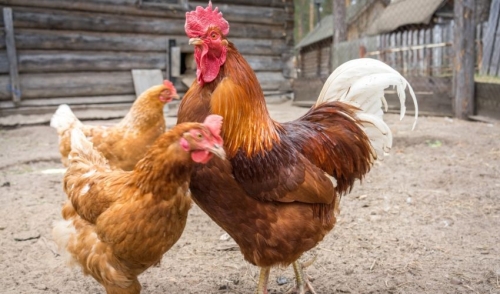{article.name}
Stay Informed
Tips on Rooster Care

- Share this:
- Share on Facebook
- Pin on Pinterest
- Tweet on Twitter
A rooster can be a valuable and even an essential addition to your poultry flock, but you need to be prepared to meet these birds’ unique needs. Understanding roosters, their roles in a backyard poultry flock, and their special care requirements can help you keep your flock healthy and productive.
Do You Need a Rooster?
If your sole purpose for keeping chickens is egg production, you may never need a rooster at all – hens will lay just as productively without the presence of a rooster, and their eggs will be just as nutritious. There are many benefits to keeping a rooster with your hens, however, and a strong, healthy cockerel can be a great addition to your flock. Roosters will…- Fertilize eggs to produce chicks.
This can increase your flock size for more layers, or you may sell extra chicks. Both hens and roosters can also be raised for meat, adding another dimension to the productivity of your flock.
- Guard and protect the flock.
Roosters stay much more alert than hens, watching for potential predators and raising alarms when threats are noticed. They will also attack predators to safeguard their hens.
- Complete the flock’s hierarchy.
Chickens have evolved to naturally have a lead bird, a role that is most easily filled by a larger, stronger rooster. This can help keep hens calmer and reduce aggressiveness among hens.
- Find and share more food sources.
When a rooster finds a food source, such as insects, seeds, or scraps, he will call to the hens to bring them to the food. This can help your entire flock forage more efficiently.
- Add personality and entertainment.
Roosters are boisterous, active birds that can add energy and socializing to any flock with their sometimes crazy antics.
At the same time, it is important to note that roosters can also be loud, rowdy, and aggressive – even to pets and humans. Because of this, some municipalities, homeowner associations, and zoning boards may limit or prohibit the presence of roosters, so it is wise to check local restrictions. Before you decide to get a rooster, be sure it is the right decision for you and your chickens.
Best Rooster Care
When you are ready to bring a rooster into your flock, you will need to adjust your chicken care to accommodate its new personality and unique needs.- Choose the right rooster breed.
Just as different hens have different personalities and productivity levels, different rooster breeds are known for different levels of noisiness and aggression. Consider your local climate and the general personalities of your hens when selecting a rooster as well to be sure he will be a good fit in your area.
- Get the right number of roosters for your flock size.
In general, one rooster is comfortable with 8-12 hens. If you have too many roosters, they will become more aggressive with one another and the hens will be similarly stressed because of too much attention from the cockerels. If you only have a few hens, it may not be in their best interest to have a rooster at all unless you increase the overall flock size.
- Socialize your rooster right away.
The more your rooster interacts with you and gets to know you, right from the time he is a chick, the better adapted he will be to your presence. This will help establish your social dominance as the flock leader and will make it easier to examine the bird if needed, since he will be accustomed to you and will be more comfortable being held.
- Provide higher protein feed.
Roosters require higher protein in their diet than hens. Providing supplemental protein or a protein-rich food will keep your rooster in peak condition, but don’t disrupt the hens’ diet to do so. Instead, feed your rooster separately or offer the high-protein feed in a taller feeder that only the rooster can easily reach.
- Watch for wounds and injuries.
Because roosters can be aggressive, they will often get small wounds and scratches that could easily become infected. Watch carefully for any injuries, and treat wounds right away to prevent serious infections and discomfort. Similarly, be sure no hens are suffering from undue rooster attention.
- Keep spurs and nails in good condition.
Roosters have long spurs that are their primary weapons, but those spurs – as well as the bird’s talons – can break or crack and may need occasional trimming or filing to stay in the best shape. This is especially important as roosters age and their nails become more brittle.
- Protect roosters from excessive cold.
Because roosters have larger combs and wattles, that bare skin is highly susceptible to cold and frostbite. Provide a draft-free, insulated coop to keep the birds warm, and consider a supplemental heat lamp if needed during cold snaps. Install a windbreak to give the birds outdoor shelter as well, and take other steps to protect them from extreme cold.
Roosters can be a rich and lively addition to your chicken flock, if you’re aware of their needs and how to care for them properly. Before you know it, your rooster will be the welcome kingpin of your coop.
Special Offers
We are constantly adding new specials to our site. Be sure to check back often!

Comments